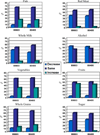Comparison of dietary and lifestyle habits among stage III and metastatic colorectal cancer patients: findings from CALGB 89803 and CALGB 80405
- PMID: 23317558
- PMCID: PMC3790266
- DOI: 10.1016/j.clcc.2012.11.002
Comparison of dietary and lifestyle habits among stage III and metastatic colorectal cancer patients: findings from CALGB 89803 and CALGB 80405
Abstract
Self-administered questionnaires were completed by patients undergoing chemotherapy for stage III colon cancer (n=1095) and metastatic colorectal cancer (n=875). We describe the prevalence of a wide-range of health-related dietary patterns and lifestyle behaviors among colorectal cancer patients with stage III and metastatic disease and report notable similarities in these 2 cohorts.
Background: Cancer patients often pursue lifestyle and dietary changes with the aim to improve outcomes. Using data from 2 large National Cancer Institute-sponsored clinical trials, we report on the dietary and lifestyle practices of patients receiving therapy for stage III colon or metastatic colorectal cancer.
Patients and methods: Self-administered questionnaires were completed by patients undergoing chemotherapy for stage III colon cancer (n=1095) and metastatic colorectal cancer (n=875). Descriptive statistical analyses were performed to evaluate anthropometrics, diet, and lifestyle in each cohort.
Results: Median body mass index was comparable for stage III and metastatic patients (27.3 vs. 26.5 kg/m2). Stage III patients reported a modestly higher median level of physical activity than metastatic patients (4.6 vs. 3.4 metabolic equivalent task-hours per week). Ten percent of stage III and 9% of metastatic patients reported ongoing cigarette use. Avoidance of alcohol was reported by 47% of stage III and 43% of metastatic patients. Dietary patterns for both groups were comparable with more than 80% of stage III and metastatic patients failing to meet the recommended daily intake of vegetables, fruits, and milk products. Usage of at least 2 multivitamins per week was reported by 49% of stage III and 40% of metastatic patients. Two percent of stage III and 5% of metastatic patients reported vitamin D supplement use.
Conclusions: We observed notable similarities in dietary and lifestyle behaviors between stage III colon and metastatic colorectal cancer patients actively receiving chemotherapy. Future research should aim to elucidate the effect of these behaviors on patient outcomes.
Copyright © 2013 Elsevier Inc. All rights reserved.
Figures
References
-
- Siegel R, Naishadham D, Jemal A. Cancer statistics, 2012. CA Cancer J Clin. 2012;62:10–29. - PubMed
-
- Giovannucci E. Modifiable risk factors for colon cancer. Gastroenterol Clin North Am. 2002;31:925–943. - PubMed
-
- Martinez ME. Primary prevention of colorectal cancer: lifestyle, nutrition, exercise. Recent Results Cancer Res. 2005;166:177–211. - PubMed
-
- Satia JA, Campbell MK, Galanko JA, James A, Carr C, et al. Longitudinal changes in lifestyle behaviors and health status in colon cancer survivors. Cancer Epidemiol Biomarkers Prev. 2004;13:1022–1031. - PubMed
-
- Patterson RE, Neuhouser ML, Hedderson MM, Schwartz SM, Standish LJ, et al. Changes in diet, physical activity, and supplement use among adults diagnosed with cancer. J Am Diet Assoc. 2003;103:323–328. - PubMed
Publication types
MeSH terms
Substances
Grants and funding
LinkOut - more resources
Full Text Sources
Other Literature Sources
Medical



